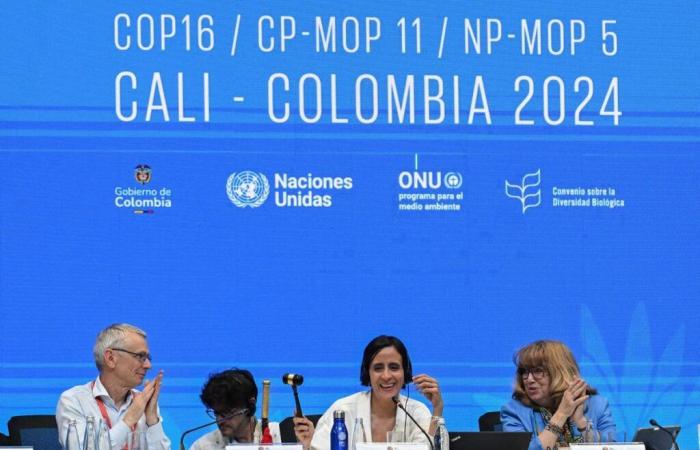Global biodiversity –
COP16 concludes agreement on genetic resources
The COP16 countries, meeting this Saturday in Colombia, adopted the “Cali fund” to share profits from genetic resources and protect nature.
Published today at 2:52 p.m.
COP16 Executive Secretary David Cooper, Colombian Environment Minister and COP16 President Susana Muhamad (C) and COP16 Secretary Astrid Schomaker attend the final plenary session of the COP16 Summit in Cali .
AFP/JOAQUIN SARMIENTO
Subscribe now and enjoy the audio playback feature.
BotTalk
The 196 nations of COP16 biodiversity adopted on Saturday in Cali, Colombia, the implementation of a multilateral fund supposed to be supplemented by companies making profits thanks to the digitized genome of plants or animals from developing countries.
These countries hope that this financial mechanism, called the “Cali Fund”, will make it possible to raise billions of dollars, intended to finance their nature protection commitments.
But the amount that will actually be collected, mainly through voluntary contributions, remains uncertain.
The “looting” of the wealth of developing countries, “this is the problem that we are all trying to solve here,” declared the representative of Brazil in plenary.
Sea serpent
Equitable sharing of benefits from “digital sequencing information on genetic resources” (DSI) is a sea serpent of the COPs on biodiversity.
This data, often from species present in poor countries, is used in the manufacture of medicines or cosmetics, among others, which can bring in billions.
But little of the benefit from this genetic data – uploaded to open-access databases – accrues to the original communities.
The vanilla that flavors ice creams, synthesized in the laboratory, is thus derived from the genetic sequencing of a plant formerly known only to a Mexican tribe.
The COP15 biodiversity in 2022 recorded the creation of this long-requested fund, but its operation remained to be determined.
Standoff between India and Switzerland
In Cali, negotiators argued for nearly two weeks over fundamental questions: who pays, how much, into which fund and how to distribute the money?
Saturday at dawn, in the 10th hour of a laborious nocturnal plenary, the details of the fund were adopted, after a final standoff involving India and Switzerland in particular.
The fund should be supplemented by companies using DSIs and which “should pay a proportion of their profits or revenues to the global fund”. Those of a certain size should contribute indicative amounts of 1% of profits or 0.1% of revenues, according to the document.
Distribution of the fund
Placed under the aegis of the UN, the fund will distribute the money, half for the countries, half for indigenous peoples.
The agreement lists the targeted sectors, including pharmaceuticals, food supplements, cosmetics and biotechnology. The agro-industry, after an attempt by Argentina to exclude it according to two sources close to the negotiations, is also concerned.
The summit, which was to end on Friday, went into overtime on Saturday due to tensions between the countries of the North and the South over financing the road map adopted by humanity two years ago to stop the destruction of nature by 2030.
“Latest news”
Want to stay on top of the news? “Tribune de Genève” offers you two meetings per day, directly in your email box. So you don’t miss anything that’s happening in your canton, in Switzerland or around the world.
Other newsletters
Log in
AFP
Did you find an error? Please report it to us.
0 comments






